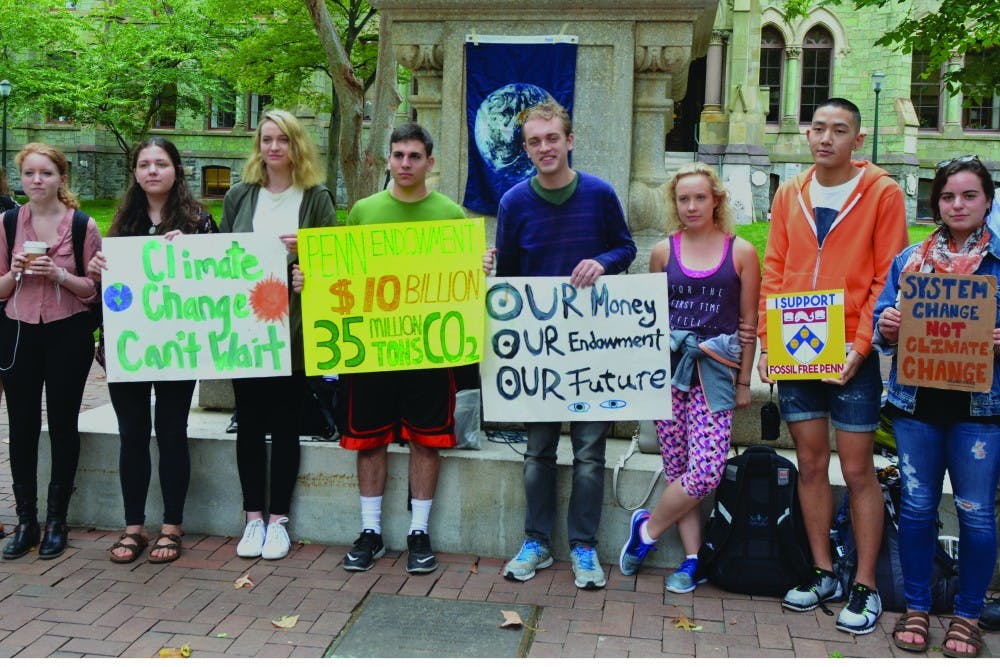
Fossil Free Penn reacts strongly against the decision by the Board of Trustees to refrain from divesting from fossil fuel industries.
Credit: Zach SheldonLast Thursday, the Board of Trustees announced that Penn will not divest from fossil fuel industries, despite two years of campaigning from Fossil Free Penn.
The decision came after the unanimous recommendation of an Ad Hoc Advisory Committee on Divestment, which was formed in March to consider the divestment proposal submitted by Fossil Free Penn in November 2015, not to divest. The proposal was put forth after a student referendum in February 2015 in which over 30 percent of undergraduates voted, with almost 90 percent of votes in support of divesting from fossil fuel companies.
“The really important thing right now is that this is far from over,” College sophomore and Fossil Free Penn member Zach Rissman said, in response to the decision.
The Committee, which consisted of faculty, students, staff and alumni, met four times in person and found that the Fossil Free Penn Divestment proposal did not meet the criteria set forth in the Guidelines and Procedures for Consideration by the Trustees of Proposals for Divestment.
Chairman of the Board of Trustees David Cohen explained in a letter to Fossil Free Penn that “the linchpin of any divestment decision at Penn” is that the “moral evil” protestors linked to fossil fuel companies must be “an activity on par with apartheid or genocide.”
Cohen explained that “while the Trustees recognize that the ‘bar’ of moral evil presents a rigorously high barrier of consideration...such a high barrier must be maintained so that investment decisions and the endowment are not used for the purpose of making public policy statements.”
Members of Fossil Free Penn feel that this explanation is insufficient.
“They had no legitimate reason in their response; they did not respond to any of our research and they were going to say no from the beginning,” Rissman said.
In a public statement issued after the Trustees’ decision, Fossil Free Penn said that “the Ad Hoc Advisory Committee was egregiously biased” and “its illegitimate decision does not accurately represent the university community.”
Fossil Free Penn explained that the Trustees chose David Roberts, a managing director at an investment firm that finances oil and gas companies, to be the Committee Chair who “held ultimate control and influence over the committee.” They also chose then-Engineering senior Dillon Weber, who had previously published public articles that disapproved of divestment based on ideology and personal interests, to serve on the Committee.
Weber wrote in the Spring 2015 issue of Penn Sustainability Review that, “though I’m sure many students at Penn would be overjoyed, I personally hope to never see the headline ‘Penn Divests’ splashed across the front page of the Daily Pennsylvanian.”
The remaining Committee members had not previously publicly supported or campaigned in favor of divestment.
“The entire process was rigged against us,” Rissman said. “Right now we need to show the University overwhelmingly that rejecting the proposal is against the views of Penn.”
Rissman said Fossil Free Penn’s next step is to raise greater awareness about its cause.
“We can see this as the tipping point. Before, we were following the rules, we were very respectful — but there was no mutual respect,” he said. “This rejection only energizes us.”
The group plans on getting more faculty support. It has already released an open letter in April 2016, featuring over 100 faculty signatories from 10 of Penn’s 12 schools. They also hope to reach out to climate scientists who work at Penn to speak out against Penn’s decision.
Instead of recommending divestment, the Ad Hoc Committee suggested other strategies such as considering whether the companies Penn invests in or conducts business with are “taking into account the effects of climate change and possible regulatory responses.”
It also recommended using proxy voting to increase attention to issues relating to greenhouse gas emissions and climate change, pointing to Yale as a model for shareholder engagement.
“The idea behind that is, given the fact that we have investments in these companies and therefore we own a small part of these companies, we can influence those companies in their actions and change the industry,” Rissman said.
However, Rissman explained that his brother, Gabe Rissman, who helped co-found Fossil Free Yale, experienced firsthand the inadequacy of this method.
“My brother went to an Exxon Mobil investor shareholder conference this summer and spoke on behalf of Yale in the exact situation of shareholder engagement,” Rissman said. “He told the company to release more data given Exxon’s ambiguity but all they responded with was ‘thank you for your comment, bye.’”
Given his brother’s personal experience, Rissman is skeptical about the effectiveness of the strategies the Committee has put forward for Penn to follow as its next steps.
“The only viable action is divestment, and anything less than that is not good enough,” he said.
The Daily Pennsylvanian is an independent, student-run newspaper. Please consider making a donation to support the coverage that shapes the University. Your generosity ensures a future of strong journalism at Penn.
DonatePlease note All comments are eligible for publication in The Daily Pennsylvanian.








